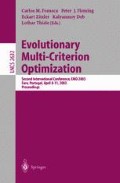Abstract
The classic NFL theorems are invariably cast in terms of single objective optimization problems. We confirm that the classic NFL theorem holds for general multiobjective fitness spaces, and show how this follows from a ‘single-objective’ NFL theorem. We also show that, given any particular Pareto Front, an NFL theorem holds for the set of all multiobjective problems which have that Pareto Front. It follows that, given any ‘shape’ or class of Pareto fronts, an NFL theorem holds for the set of all multiobjective problems in that class. These findings have salience in test function design. Such NFL results are cast in the typical context of absolute performance, assuming a performance metric which returns a value based on the result produced by a single algorithm. But, in multiobjective search we commonly use comparative metrics, which return performance measures based non-trivially on the results from two (or more) algorithms. Closely related to but extending the observations in the seminal NFL work concerning minimax distinctions between algorithms, we provide a ‘Free Leftovers’ theorem for comparative performance of algorithms over permutation functions; in words: over the space of permutation problems, every algorithm has some companion algorithm(s) which it outperforms, according to a certain well-behaved metric, when comparative performance is summed over all problems in the space.
Access this chapter
Tax calculation will be finalised at checkout
Purchases are for personal use only
Preview
Unable to display preview. Download preview PDF.
References
Christensen, S. and Oppacher, F. (2001) What can we learn from No Free Lunch? A First Attempt to Characterize the Concept of a Searchable Function, in L. Spector et al (eds), Proc. of GECCO 2001, Morgan Kaufmann, pp. 1219–1226.
Deb, K. (1999) Multi-objective Genetic Algorithms: Problem Difficculties and Construction of Test Problems, Evolutionary Computation 7(3): 205–230.
Deb, K, Agrawal, S., Pratab, A. and Meyarivan, T. (2000) A fast elitist non-dominated sorting genetic algorithm for multiobjectie optimization: NSGA-II, KanGAL Technical Report 200001, Indian Institute of Technology, Kanpur, India.
Droste, S., Jansen, T. and Wegener, I. (1999), Perhaps Not a Free Lunch But At Least a Free Appetizer, in W. Banzhaf, J. Daida, A. E. Eiben, M. H. Garzon, V. Honavar, M. Jakiela and R. E. Smith (eds.) Proc. of GECCO 9), Morgan Kaufmann Publishers, Inc., pp. 833–839.
Droste, S., Jansen, T. and Wegener, I. (2002) Optimization with Randomized Search Heuristics — The (A)NFL Theorem, Realistic Scenarios, and Difficult Functions”, Theoretical Computer Science, to appear, and http://citeseer.nj.nec.com/droste97optimization.html.
Hansen, M.P. and Jaszkiewicz, A. (1998) Evaluating the quality of approximations to the non-dominated set, Tech. Report IMM-REP-1998-7, Technical University of Denmark.
Igel, C. and Toussaint, M. (2001) On Classes of Functions for which No Free Lunch Results Hold, see http://citeseer.nj.nec.com/528857.html .
Knowles, J.D. (2002) Local search and hybrid evolutionary algorithms for Pareto optimization, PhD Thesis, Department of Computer Science, University of Reading, UK.
Knowles, J.D. and Corne, D.W. (2002) On metrics for comparing non-dominated sets, in Proc. 2002 Congress on Evolutionary Comp., IEEE Service Center, Piscataway, NJ.
Radcliffe, N.J. and Surry, P.D. (1995) Fundamental Limitations on Search Algorithms: Evolutionary Computing in Perspective, in Computer Science Today, 275–291
Schumacher, C., Vose, M.D. and Whitley, L.D. (2001) The No Free Lunch Theorem and Problem Description Length, in L. Spector et al (eds), Proceedings of the Genetic and Evolutionary Computation Conference (GECCO 2001), Morgan Kaufmann, pp. 565–570.
Van Veldhuizen (1999) Multiobjective Evolutionary Algorithms: Classifications, Analyses, and New Innovations, PhD Thesis, Dept. of Electrical and Computer Eng., Graduate School of Engineering, Air Force Institute of Technology, Wright-Paterson AFB, Ohio.
Whitley, L.D. (1999) A Free Lunch Proof for Gray versus Binary Encodings, in Wolfgang Banzhaf and Jason Daida and Agoston E. Eiben and Max H. Garzon and Vasant Honavar and Mark Jakiela and Robert E. Smith (eds.) Proceedings of the Genetic and Evolutionary Computation Conference, volume 1, Morgan Kaufmann, pp. 726–733.
Whitley, L.D. (2000) Functions as Permutations: Implications for No Free Lunch, Walsh Analysis and Statistics, in Schoenauer, M., Deb, K., Rudolph, G., Yao, X., Lutton, E., Merelo, J.J. and Schwefel, H.-P. (eds.) Proc. of the Sixth International Conference on Parallel Problem Solving from Nature (PPSN VI), Springer Verlag, Berlin, pp. 169–178.
Wolpert, D.H. and Macready, W.G. (1995) No Free Lunch Theorems for Search, Santa Fe Institute Technical Report SFI-TR-05-010, Santa Fe Institute, Santa Fe, NM.
Wolpert, D.H. and Macready, W.G. (1997) No Free Lunch Theorems for Optimization, IEEE Transactions on Evolutionary Computation 1(1): 67–82.
Zitzler, E. (1999) Evolutionary Algoirthms for Multiobjective Optimization: Methods and Applications, PhD Thesis, Swiss Federal Institute of Technology (ETH), Zurich, Switzerland, November.
Zitzler, E., Thiele, L., Laumanns, M., Fonseca, C.M., Fonseca, V.G. (2002) Performance assessment of multiobjective optimizers: an analysis and review, available from the url: http://citeseer.nj.nec.com/zitzler02performance.html .
Author information
Authors and Affiliations
Editor information
Editors and Affiliations
Rights and permissions
Copyright information
© 2003 Springer-Verlag Berlin Heidelberg
About this paper
Cite this paper
Corne, D.W., Knowles, J.D. (2003). No Free Lunch and Free Leftovers Theorems for Multiobjective Optimisation Problems. In: Fonseca, C.M., Fleming, P.J., Zitzler, E., Thiele, L., Deb, K. (eds) Evolutionary Multi-Criterion Optimization. EMO 2003. Lecture Notes in Computer Science, vol 2632. Springer, Berlin, Heidelberg. https://doi.org/10.1007/3-540-36970-8_23
Download citation
DOI: https://doi.org/10.1007/3-540-36970-8_23
Published:
Publisher Name: Springer, Berlin, Heidelberg
Print ISBN: 978-3-540-01869-8
Online ISBN: 978-3-540-36970-7
eBook Packages: Springer Book Archive

